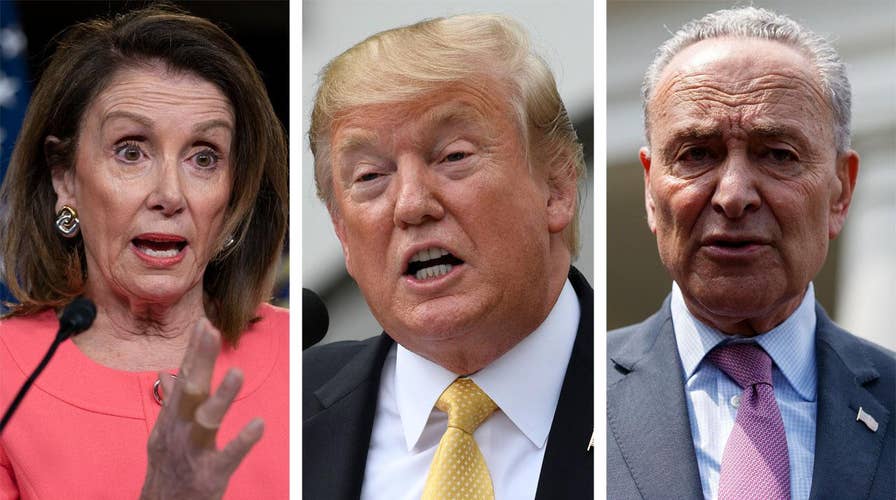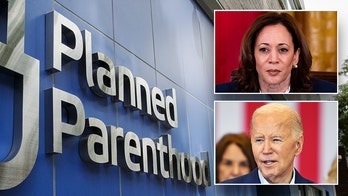Trump, Schumer and Pelosi reach $2 trillion infrastructure agreement
American Society of Civil Engineers senior managing director Casey Dinges says it is encouraging to have presidential leadership on the infrastructure issue.
It’s all about preservation.
The 2020 elections are more than a year-and-a-half away. And lawmakers from both sides of the aisle could soon look for ways to preserve themselves.
Let’s start with congressional Republicans.
BIDEN'S RESURFACED 2007 COMMENTS ON IOWA, RACE, EDUCATION SPARK BACKLASH
Scores of Capitol Hill GOPers took a dim view of President Trump prior to the 2016 election. But most rallied to his defense and many even heralded the findings of the Mueller report. Republicans quickly learned they needed to stand foursquare behind Trump. They knew that any fissures could expose them to a presidential-infused primary challenge from the right, the ire of the president, or, at the very worst, fracture the party. The latter scenario would virtually incinerate the GOP.
Consider where Republicans stand now compared to a few years ago. The party failed in its promise to repeal and replace Obamacare. Federal spending is spiking. Republicans hyperventilated over the behavior of President Clinton in the late 1990s. Those concerns virtually dissolved when it came to Trump.
GOPers possess limited turning radius when it comes to Trump. So, it’s a lot easier to pillory the other side and portray as many Democrats as possible as disciples of liberal House freshmen like Reps. Alexandria Ocasio-Cortez, D-N.Y.; Rashida Tlaib, D-Mich.; and Ilhan Omar, D-Minn. It also behooves Republicans to foment worry about liberal ideals such as Medicare for All and the Green New Deal.
That’s to say nothing of the left-wing ideas propounded by Democratic presidential contenders ranging from Sen. Bernie Sanders, I-Vt., to Sen. Elizabeth Warren, D-Mass. Republicans know the best shot to re-elect Trump -- and perhaps themselves -- is to foster radical narratives about Democratic presidential candidates. Republicans quietly cheer that Democrats will tap the most-liberal candidate possible. That gives GOPers a chance to juxtapose their views with that of the Democratic nominee in dozens of battleground House districts in Michigan, Iowa, New Hampshire, Oklahoma, Pennsylvania, and Illinois. Republicans are rooting that Democrats overplay their hand, chattering incessantly about problems with the Mueller Report and the possibility of impeachment.
Democrats face their own issues when it comes to self-preservation.
House Speaker Nancy Pelosi, D-Calif., understands the fragility of the Democratic coalition which returned the gavel to her grasp. Pelosi is walking a reed-thin line when it comes to vigorous oversight of the Trump administration and impeachment. But Pelosi understands that impeachment -- or anything that even appears too muscular -- puts those aforementioned Democratic freshmen in swing districts at risk. Impeachment discussions 18-plus months before the election could imperil Pelosi’s side. Democratic polling shows the party is far better off discussing health care, jobs and other meat and potatoes issues. That’s why Pelosi recently touted efforts to defeat the president soundly in 2020 so there’s no question about “legitimacy” and perhaps even talk of a Democratic “mandate.”
A decisive Democratic win is the best sort of self-preservation for that side. Ironically, Democrats need to gin up the base and those who bankroll the party with impeachment discussions and a focus on upcoming Supreme Court picks. But those moderate Democrats who helped the party win the House must be wary of the party selecting a presidential nominee far from the center.
AMY KLOBUCHAR'S FOX NEWS TOWN HALL: 4 TAKEAWAYS TO KNOW
The viability of a Democratic presidential nominee who works nationally for the party and in a swing district represented by House Democrats is one who molds themselves around a vision embraced by Democratic freshmen in key caucus and primary states like Iowa, New Hampshire and South Carolina. Consider if candidates melded themselves into the images of freshman Reps. Cindy Axne, D-Iowa, Abby Finkenauer, D-Iowa, Chris Pappas, D-N.H., and Joe Cunningham, D-S.C. All but Pappas flipped their districts from red to blue last cycle. Liberal Democrats won’t excel in these places.
A Democratic presidential candidate who emulates some members of the freshman class could draft disaffected voters who joined the 2016 Trump coalition.
But there is another side to this coin. A Democratic presidential candidate who is too extreme or in tune with left-wing of the party could damage the chances of these freshmen – as well as dozens of others. Democrats could lose control of the House if voters fear their nominee is liberal. More than two-dozen House Democrats hold seats Trump won during the last presidential cycle. The symbiosis between those House seats and the presidential vote may help determine which party is successful in both sets of contests next year. Democrats must strike a balance with that synergy between House and presidential candidates. Democrats could be all about self-preservation if the two don’t jibe.
This brings us back to the Republicans. Trump’s poll numbers are consistently low. House Republicans could have to build a firewall and show distance between themselves and the president to hold their seats – especially if the Democratic nominee is performing well in September and October next year. Think of how Republican members ran away from President George W. Bush in late 2008. Democrats may have to do the same thing if their nominee struggles to appeal to a broad national base and not just coastal or urban voters. And again, plenty of GOPers were late in embracing Trump in 2016. It was only after the president won that lots of Republicans scurried in his direction.
These problems aren’t new for either party. There are always incongruities with the top of the ticket and down ballot. There are “coattails,” such as they are. There is also drag on the lower part of the ticket. Both sides always have to reconcile these differences. No election is run in a vacuum. The only thing which doesn’t change is self-preservation. And everyone will be looking for their own life preserver if the ship is going down.





